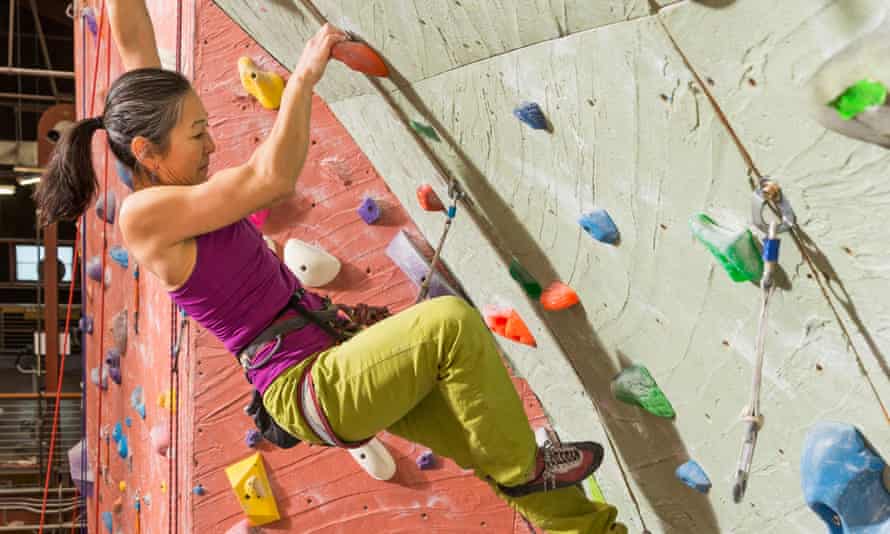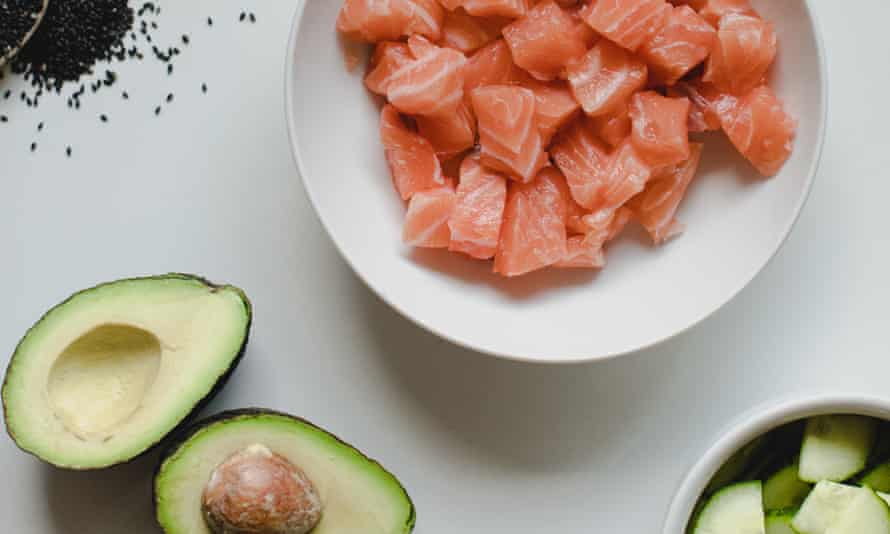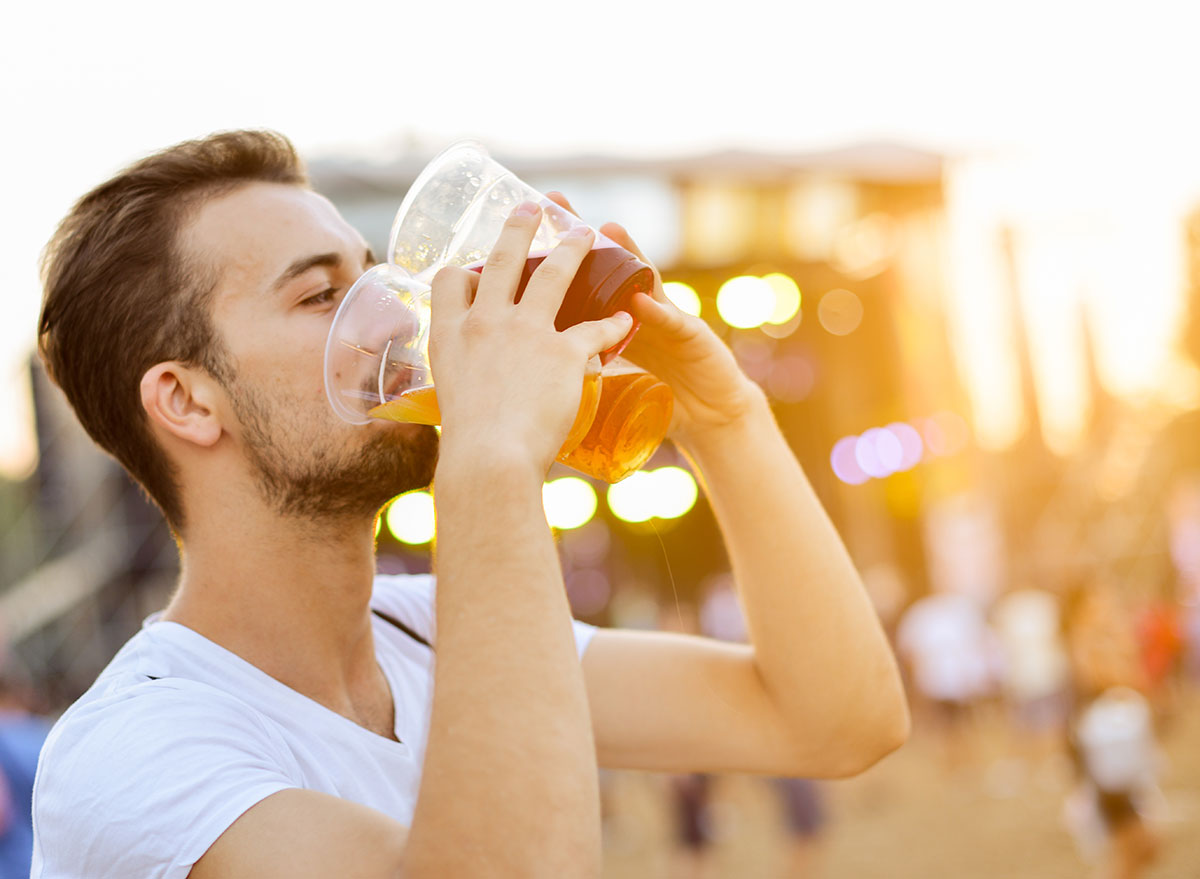Sometimes your body notices things before your mind does: you might think you’re so far away from the menopause that a hot flush is just a thing you can fake to get out of a boring situation, but your midriff knows better. Lucinda Meade, 57, is a physiotherapist and personal trainer. She has trained many clients through the menopause and says it tends to start with surreptitious weight gain around the middle, which they then can’t shift. It may be accompanied by aches and pains in smaller joints, and an unappetising smörgåsbord of “mood changes, sleep changes, annoying visits to the GP to be given antidepressants”.
All this makes perfect sense from a hormonal perspective, as another trainer, Sarah Overall, 51, describes: “Oestrogen governs so many of your bodily processes, and one of the things it’s involved in is water regulation. It’s a lot easier for tendons and ligaments and joints to become dehydrated. And that can also lead to a resurgence of old injuries.” Plus, “when your female hormones decrease, you go from having a gynoid shape, carrying fat on your hips and thighs, to android obesity, abdominal fat, which is a male shape.”
But what are you supposed to do, fitness-wise? Should you power through the aches, pains and lethargy, or just give up on being fit until you are out the other side? Are there adjustments you can make to the way you exercise and eat? Can you make it any better by working up to it beforehand? Finally, are there any upsides to the menopause, or is it just an irksome creep towards death, only ameliorated by the fact that it happens to (half of) everyone?
Arj Thiruchelvam, a personal trainer who coaches elite athletes, says of this power-through or take-a-break dilemma: “Always make the decision on a macro, rather than a micro, level.” In macro terms, to give up exercise during your menopause would be a disaster as your muscle mass decreases with age “at the rate of about 1% a year. For menopausal women, it’s much more substantial than that.” You need muscle mass to protect your bones, not to mention, as Meade says, the fact that it “decreases cell death, increases stem cells and decreases fat cells, which are a secretor of inflammatory markers. Ageing is all about chronic, low-level inflammation.”
On a micro level, though, Thiruchelvam says, “if you’ve had hot flushes throughout the night and not slept, it’s probably worth listening to your body and giving yourself a rest.” Overall has a 10-minute rule: “If I wake up and I don’t feel like a workout, I think, I’ll do 10 minutes and if I still feel rubbish, I’m going to stop. That’s the biggest piece of advice I can give anyone – 95% of the time you’ll feel fine after 10 minutes.”

It’s also important to have weekly rather than daily goals, and be flexible (mentally as well as physically): use your energy when you have it, rather than beating yourself up about the times you don’t. This will mean prioritising yourself and flaking out of other obligations, but that’s fine – your oestrogen’s dropping, so hopefully you’ll be less of a people-pleaser, too.
Now all you have to do is completely change your perception of what kind of exercise you need and enjoy. Meade explains: “A lot of women have done a lot of yoga and running and they really need to be coaxed into weight training.” This will probably be different once millennials are menopausal, since they have a huge iron woman culture and are all over calisthenics (building strength using your own bodyweight). But women now in their late 40s and 50s will have had their formative years in the 1980s, when exercise was all about looking skinny and weight-training was unpopular. Younger readers may not believe it, but magazines were absolutely full of the perils of muscle-building, and how once you’d given yourself huge beefy shoulders, there’d be no going back.
But there is more than one way to skin this cat. “Dancing, rock climbing, climbing trees, anything: find the thing that works for you,” says Meade. “But there must be some strength element.” Elite athletes, being so body-literate, often notice sooner than the rest of us that something has to change. Jenny Stoute, 56, represented the UK in the Olympics in Seoul and Barcelona, taking bronze in the 4 x 400m relay, before she became Rebel, the Gladiator, in 1996. Her menopause started two years ago, and now she says she can’t even jog. “If I went out on the road, springing up and down, my hamstrings would be history. I know my lower back doesn’t like too much impact. So I’ll do weights and body-bearing stuff, go on the rower, go on the cross-trainer. To be fair, I don’t really want to run 100 metres. I had my time. All I want to do is look after my body to the best of my abilities.”
It’s a really good idea to get ahead of this if possible. “People go into the menopause like some ghastly blind date where you know it’s going to happen but you hope it’s going to be OK,” Meade says. “Everyone in their 40s should be thinking about getting themselves in tip-top shape so that when it happens, it’s as fine as it can be. Don’t treat it like a lottery and don’t wait until you’re feeling crap and then try to make decisions in that state.”
Besides strength training, what does this actually look like? Work on your diet, so that your blood sugar isn’t fluctuating too much: this can stave off the worst of the hot flushes, and will also help with mood swings. Don’t try a ketogenic diet but do use a protein calculator, as protein-rich meals can help in maintaining muscle mass. You might want to adjust your portion size to suit your reduced basal metabolic rate (this is the amount of energy you use at rest, doing basic tasks like breathing and keeping warm) – or you might think, sod it, one thing at a time. Take vitamin D and calcium supplements, and omega-3s – the first two for bone health, since the loss of oestrogen often causes osteoporosis, the third for mood.

Work on the dehydration, not just by gulping water when you remember but by learning to recognise your personal signs of being dehydrated, and figure out when in the day it’s at its worst. A lot of menopausal women say they suddenly have no tolerance for alcohol and start to see wine, especially, as a kind of kryptonite. But it’s essentially just that the concentration of alcohol in your blood is higher. I’m not saying you have to drink – just that, if you stay really well hydrated, maybe you can.
If you haven’t got a sympathetic GP, see a pelvic health physiotherapist. “Your pelvic floor muscles weaken regardless of whether you’ve had children or not, so bladder control becomes an issue as well,” Overall says. Trampolining is a famous no-no for the menopausal, but running can also highlight bladder-control issues. I personally wouldn’t sweat it. You’re probably going to have a shower when you get home anyway. And that’s not even the worst of it: “A lot of women will have had untreated issues from childbirth and then the menopause hits, on top of maybe a tiny little prolapse … vaginal atrophy is a nightmare,” Meade says. Pilates, generally, and Kegels in particular will help. In addition, it’s a good idea to find out what your family history is, particularly with osteoporosis. The more likely you are to get it, the more important it is that you do the strength-building work that will protect your bones.
Everybody I speak to is of one mind on HRT: if it works for you, do it, and start as soon as you get symptoms – don’t wait until they are unbearable. There is a certain reticence about starting HRT, a misplaced stoicism, a sense that you only need it because you’re weak. Most of the perceived risks of HRT are historical and have been substantially reduced by developments to the drug regimen; there is a negligible rise in the risk of breast cancer, for instance, with oestrogen-only HRT.
Menopause symptoms interact with one another in unhelpful ways: sleep deprivation because you’re too hot doesn’t help with the mood swings, and a low mood makes things look worse than they are. So many menopausal people, including fitness experts, take a harsh view of their changing bodies. “The bloating is terrible,” Overall says. “People are looking at me for their fitness and I look like a Michelin man.” Stoute says her own athletic past has made her more of a wreck. “Anyone who used to be top of the tree in the sporting world is thinking, ‘My whole body feels like it’s falling apart.’ It’s almost like the fitter you are at your peak, the worse the other end becomes.” I look her up on Instagram (@gorgeousfifties), and find she still looks incredible. “Be kind to yourself” sounds like a cliche, but it’s worth doing anyway.
And finally, is there anything good to be said for the experience? Meade delivers this rousing statement: “It’s a wake-up call. You’re likely to live until you’re nearly 90. How do you want it to be? How do you want to feel? Make a plan for that. It’s a reminder that you can make choices and change your life for the better. Don’t be a victim; you can fix it. I’m much fitter than I was before.”
Overall agrees: “I’m not there yet, but friends who’ve come out the other side say it’s absolutely brilliant. You don’t have to worry about periods any more, you don’t have hormonal fluctuations, you feel great. Nobody has ever said to me, ‘This is rubbish. I miss periods.’”

